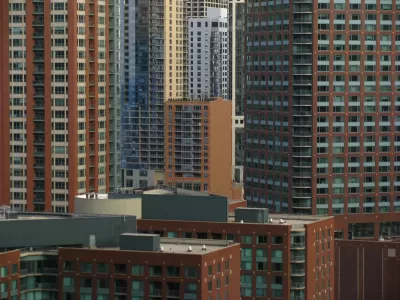Zoning changes have been a popular way to increase density and affordable housing, but more diversified policies could fill in the gaps where zoning fails.

Long favored by urbanists as a panacea for housing issues, upzoning enhances density requirements and permits increased floor areas and number of floors for new residential construction in exchange for a certain percentage of affordable units. These policies are aimed at increasing density in highly-valued, transit-adjacent urban neighborhoods and raising the number of housing units available. After decades of prioritizing single-family homes, upzoning has the promise of promoting density and encouraging more affordable multi-family buildings in areas that desperately need more housing.
Cities have come to rely on zoning to solve a broad range of economic and social issues, but just how far can zoning go? From historic red-lining to Seattle's recent plan to reduce the number of gas appliances in multi-family buildings while exempting single-family homes, many zoning policies reduce broad policy objectives to arbitrary rules that conveniently exempt certain neighborhoods and fail to apply rules equitably. Zoning wasn't designed to create more housing, and as city leaders try to undo its well-documented history as a tool for segregation, new policies must address inequities and acknowledge the need for other interventions.
FULL STORY: Dubicki: When Upzoning Becomes a Fool’s Errand

Maui's Vacation Rental Debate Turns Ugly
Verbal attacks, misinformation campaigns and fistfights plague a high-stakes debate to convert thousands of vacation rentals into long-term housing.

Planetizen Federal Action Tracker
A weekly monitor of how Trump’s orders and actions are impacting planners and planning in America.

In Urban Planning, AI Prompting Could be the New Design Thinking
Creativity has long been key to great urban design. What if we see AI as our new creative partner?

Cal Fire Chatbot Fails to Answer Basic Questions
An AI chatbot designed to provide information about wildfires can’t answer questions about evacuation orders, among other problems.

What Happens if Trump Kills Section 8?
The Trump admin aims to slash federal rental aid by nearly half and shift distribution to states. Experts warn this could spike homelessness and destabilize communities nationwide.

Sean Duffy Targets Rainbow Crosswalks in Road Safety Efforts
Despite evidence that colorful crosswalks actually improve intersection safety — and the lack of almost any crosswalks at all on the nation’s most dangerous arterial roads — U.S. Transportation Secretary Duffy is calling on states to remove them.
Urban Design for Planners 1: Software Tools
This six-course series explores essential urban design concepts using open source software and equips planners with the tools they need to participate fully in the urban design process.
Planning for Universal Design
Learn the tools for implementing Universal Design in planning regulations.
Appalachian Highlands Housing Partners
Gallatin County Department of Planning & Community Development
Heyer Gruel & Associates PA
Mpact (founded as Rail~Volution)
City of Camden Redevelopment Agency
City of Astoria
City of Portland
City of Laramie





























